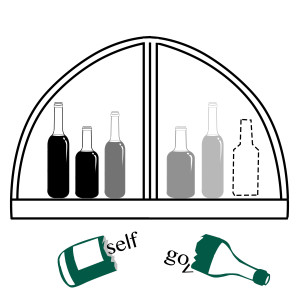Megan Tcheng
tchengme@grinnell.edu
Overlooking Mac Field and situated parallel to the Harris Center, the Cowles Apartments occupy one of the most central and public areas on campus. For any student frequenting a weekend Harris party or trudging across campus for an afternoon workout at the Bear, the angular exterior of one of North campus’s most popular dorms strikes a tone of familiarity — as do the eye-catching displays that line the apartments’ central glass windows.
The Cowles apartment windows display an array of objects that their residents choose to show off, and once featured an extensive collection of empty beer and liquor bottles, which elicited a wide range of reactions. During their peak, the bottles openly decorated the windowsills of the apartments, signifying what Connor Bailey ’16 described as his and his roommates’ “shared expression of freedom in adulthood, responsible drinking and willingness to party and dance (because there is more to life than just academics).”
Recently, however, the bottles have become the center of a campus-wide debate. Namely, requests for the removal of the display issued by the administration spurred serious pushback from numerous residents of the Cowles apartments. Annie Butler, the Residence Life Coordinator of CaNaDa, Clark and Gates residence halls, explained the buildup of events.
“Last fall, towards the beginning of December, I reached out to the apartment residents and sent out an email, asking that the bottles come down. In that email, [I] outlined my perspective as far as what I saw the bottles representing, compared to what our campus culture more accurately reflects — or hopes to create,” Butler said.
Butler’s initial proposal went largely unnoticed by the Cowles residents, until the issue resurfaced this past March. Hoping to restart a dialogue, the Cowles apartment Community Advisor (CA), John Gallagher ’17, hosted a community conversation to readdress the issue of the bottles.
Speaking to his role as CA, Gallagher outlined his general intentions for the meeting as trying to be as fair as he could.
“My goal was to be the most neutral figure possible. Also, as a student advisor, my goal was to make sure the needs of the entire community, not just my floor were being met. Things can get out of hand really quickly and sometimes you need a referee who can advocate calmly what everyone needs and what everyone wants,” he said.
Following the Cowles apartment community meeting, Sarah Moschenross, the Dean of Students, sent out a formal email outlining an official policy for the removal of the bottles. If the bottles failed to be disposed of in a week’s time, Facilities Management would be contracted to clean up the remaining items and residents would be charged for the labor accordingly.
Now, over a week after the release of Moschenross’s final email, the majority of the Cowles apartment bottles have been removed. However, despite their absence, the bottles and the dialogue surrounding their removal continue to fuel a larger debate concerning the issues of substance abuse and conduct on campus.
According to Butler, the bottles are part a bigger narrative of binge drinking and competitive drinking at Grinnell. She explained, “There have been a significant number of students who have transferred from Grinnell because of a substance culture on campus. We want to advocate for those students and provide an environment where all students can be successful. I think the bottles are not causing that alone. There is a larger substance culture on campus and this is one thing which we, as staff members, are taking responsibility for and helping students address.”
Ric Tennenbaum ’18, a current CA and facilitator of multiple support groups on campus, echoed a similar sentiment. They explained that they felt it was “insensitive to have [these bottles] on a campus that has a lot of problems with divisions between those who drink and those who don’t, those who use substances and those who don’t. It’s not helping to hold on to [these bottles]. It’s missing the point of campus community and what we really need to be fighting for.”
Bailey, a Cowles apartment resident, sees the issues surrounding the removal of the bottles differently. To him, the administration’s demands demonstrate the changing role of self-governance on campus.
“I think [this issue] shows that the administration is taking self-governance into their own hands, which is dangerous to my conception of self-gov,” he said. “This disempowers what self-governance is supposed to do … within the definition of self-gov, there needs to be room for choice. If there is no choice, there is no space for self-governance.”
All of these arguments come to a head at a very pivotal moment in the future of self-governance and substance use on campus. This past Tuesday, April 19, Andrea Connor, Associate Vice President for Student Affairs, sent out a campus-wide email that outlined 35 recommendations for campus life at Grinnell. These recommendations, which were initiated by Grinnell College’s Task Force on Residential Learning, called for the reconsideration of policies concerning substance use and abuse on campus and, additionally, asked for an updated definition of self-governance, in order to best serve the mission of the College.
This raises some tricky questions, namely: How do we portray substance use on campus? And additionally, what is in store for the future of self-governance at Grinnell?





























































